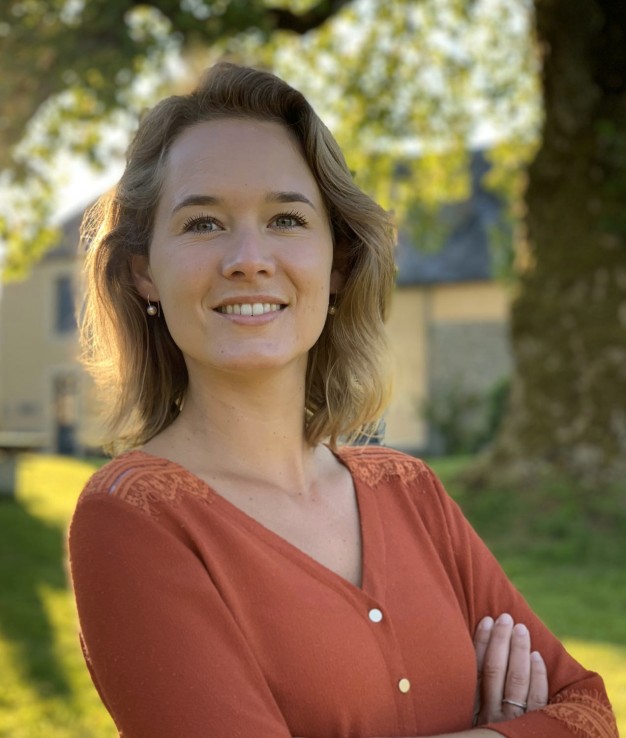Featured Fellow: Iris de Rode (2023-2024 David Center for the American Revolution Short-Term Fellow)
The Library & Museum at the American Philosophical Society supports a diverse community of scholars working on a wide-range of projects in fields including early American history, history of science and technology, and Native American and Indigenous Studies, among others. Read on to learn more about some of our fellows and their research at the APS. Additional information about our fellowship programming and other funding opportunities can be found here.
Briefly describe your research project.
My research project delves into the collaboration between France and America during the American Revolution, focusing on key figures within General Rochambeau's staff. In my work, I show that this collaboration went beyond mere military coordination, involving multifaceted exchanges over their two and a half year cooperation. These exchanges encompassed trade, diplomacy, culture, and notably, intellectual and scientific exchanges among several officers and prominent Americans. Despite its importance in fostering intellectual exchange and shaping transatlantic relations, this multifaceted aspect of the French-American alliance has largely been overlooked in historiography.
What collections did you use while working at the APS?
The American Philosophical Society in Philadelphia played a significant role as a venue and network for these exchanges. During my fellowship at APS, I explored several questions: What topics were discussed among these individuals? What were their primary interests? How actively did they participate in the society's activities? Furthermore, what transpired upon their return to France? To answer these questions, I primarily relied on the APS Minutes from 1778-1782 to glean insights into who the French Members were, details on their election, attendance at meetings, and projects. I also researched the books mentioned by the French in these minutes, along with various collections of correspondence, secondary books on the history of APS, and more general works on French-American diplomacy and the American Revolutionary War.
The French Members that were elected to the APS during the American Revolution were both diplomats and officers: Conrad Gérard de Rayneval (First French minister plenipotentiary to the US), Chevalier Anne César de la Luzerne (Second French minister plenipotentiary to the US–and Lieutenant General in the French Army), François Barbé Marbois (French consul under La Luzerne), Charles de Paulmier d’Annemours (Consul of France “of the Southern Department,” Baltimore), Jean-Baptiste Ternant (Subinspector of the Continental Army), Marquis de Lafayette (Major General of the Continental Army), François-Jean de Chastellux (Major General of the French army), and Jean-François Coste (Chief Physician of the French army). This period coincided with the revival of the American Philosophical Society after a pause in their meetings during the occupation of Philadelphia. All these French members actively participated in meetings, discussions, experiments, and maintained correspondence with their American counterparts upon their return to France.
What’s the most interesting or most exciting thing you found in the collections?
During my research, I found it particularly interesting that the French members were not only engaged in intellectual pursuits but also exchanged ideas on their inventions, such as a steam ship and “animal magnetism,” a medical practice involving magnets and a bathtub that intrigued Lafayette and Chastellux. Additionally, their interest in the natural world is evident, with discussions ranging from books on birds (which Gérard gifted to the APS), to peculiar findings like a two-headed partridge, to scientific discoveries like the bicorn, acknowledged by Madison, Jefferson, and Clarke to Chastellux. These interactions highlight the French members' selection was based on their scientific and intellectual interests and their role in fostering transatlantic exchange during and after the war, emphasizing the importance of APS as a platform for the advancement of Useful Knowledge during a transformative period of Enlightenment and revolution.
Iris de Rode received her doctorate from the Université de Paris VIII in November 2019, for her dissertation entitled François-Jean de Chastellux (1734-1788), un soldat-philosophe dans le monde atlantique à l'époque des Lumières. Her dissertation was published by Éditions Honoré Champion, 2022 and she recently won the Prix Guizot of the Académie Française for "best history book of the year" for it. Together with her PhD supervisor, Prof. Bertrand van Ruymbeke, she co-authored Le Journal de Dumas (16 juin-6 octobre 1781). Sur les traces de l'indépendance des États-Unis (Monfaucon: Éditions Jean-Jacques Wuillaume, 2018). Iris is currently working on a new English book titled "En route to Yorktown" that will be published by the University of Virginia Press in 2025. She has received 20 fellowships for her work, including from George Washington's Mount Vernon, Thomas Jefferson's Monticello and the Society of the Cincinnati. Iris has been teaching American and Transatlantic history at the French University SciencesPo Paris as an adjunct faculty member since 2013. She is also working on public history initiatives with the National Park Service, the Washington Rochambeau Revolutionary Route Association, the Philadelphia Museum of the American Revolution, and George Washington's Mount Vernon and the French embassy in Washington DC. She is also the US committee member of “america2026.eu".

